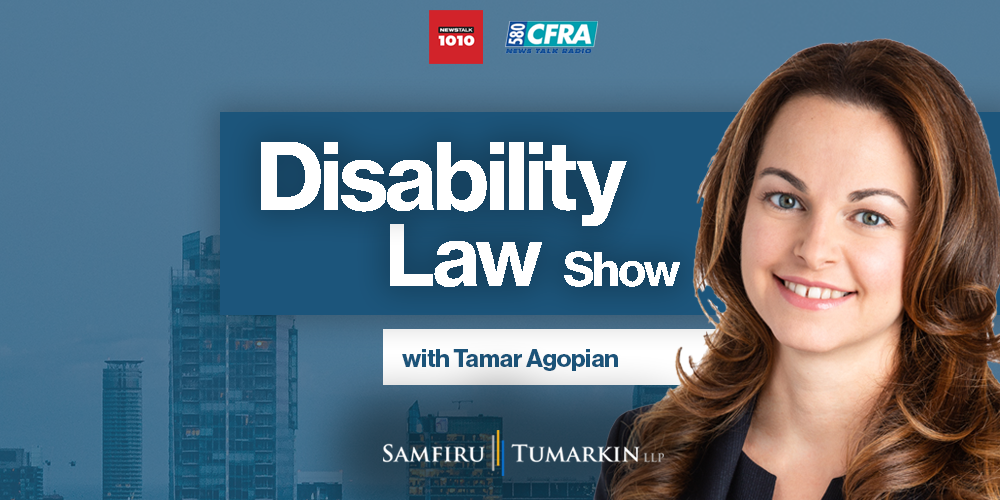Disability Law Show Bell Radio – S3 E26

Episode Summary
Discover your rights and the truth about insurance companies and long-term disability claims on Season 3 Episode 26 of the Disability Law Show on Newstalk 1010 in Toronto.
Listen below to Tamar Agopian, Disability lawyer at Samfiru Tumarkin LLP, as she guides you through the proper steps to take when your insurance provider cuts off your long-term disability or denies your insurance claim.
Listen to the Episode
Episode Notes
I’ve had a lot of issues that led to some mental health problems including substance abuse. I applied for disability benefits and they were denied due to my addiction issues. What are my options?
So the insurance company declined his benefits, and it was most likely because they were really focused on the substance issues, as opposed to looking at the overall health picture and the mental health picture. Because they thought the disability was arising out of a substance abuse issue, they excluded his claim. But insurance companies know that an exclusion for substance use is a violation of human rights. In fact, courts have said in Canada that that’s not a proper basis to decline a claim. So, the insurance companies know that, and they’ve become clever to this issue, and have now tried to find other ways under their policies to decline otherwise valid claims. And that’s exactly what they did here. And here’s the problem: I don’t think this will withstand the scrutiny of the court. I often use this as a basis to negotiate on behalf of my clients. And guess what? 99% of the time the insurance companies will come to the table, and we will get a settlement done with the insurance company, even in situations like this when they’ve never approved a long-term disability benefit.
I have been on LTD for 14 months under the care of a family doctor & specialist. I was recently told by my insurer they do not need my doctor to sign off on me being able to return to work. Is this true?
This is not true at all. I think a lot of claimants who are getting disability benefits don’t realize that the insurance company’s primary goal is to get people either back to work or off their claim. Their goal is to stop paying you the disability benefits. What the insurance company is saying – that you can return to work without your doctor signing off on it – could not be further from the truth. It’s a pressure tactic. But the best people to comment on whether you are ready to return to work are the people treating you. Because once you’ve returned to work, even though there is an option to start your LTD benefits back up again if your return to work is not successful, your insurance company is going to be fighting you hard to go back on claim, under what’s called a recurrence provision or a rehab provision.
If a person was recently denied long-term disability benefits, is this when they should get a lawyer involved?
You should definitely contact us. But I don’t want to limit it to just when people are cut-off from their disability benefits. Normally, an insurance company will give you some lead time. Do not to wait until your benefits end to contact us to get some information. We welcome phone calls and consultations at any stage of the disability process. Because sometimes the insurance company is preparing to cut someone off, and I can have that conversation with you and let you know if the strategy your insurance company is using is the beginning of the end, and help you prepare in anticipation of getting cut off and be ready to act. We try and resolve these claims usually within a year, very successful at doing so with mediation or before, but why lose even a day?
My condition got worse over the years despite treatment. I was approved for LTD and sent for a medical examination by my insurer, and the doctor made all kinds of recommendations. The continued therapy sessions are difficult due to a decline in my cognitive abilities. At what point can treatment be causing more stress? I’m worried about being cut off if I don’t comply. Is there anything I can do?
Yes, there is something that you can do. You can fight the insurance company, you can resist what it is that they’re trying to do, which is putting an unreasonable amount of pressure on you to try and capitulate to try and find a reason to cut off your claim. She says that she was approved for disability benefits back in 2018. That tells me that she’s most likely passed that magic two-year mark of getting long term disability benefits. For the first two years of being on LTD or getting LTD benefits the test for the insurance company is: does your health prevent you from going back to doing the job that you were doing at the time that you stopped working, and then after that, after those two years are up the test in most disability policies changes. It then becomes is there any occupation that you could do for which you’ve got some education, training, and experience? When individuals are moving over to this past this two-year mark, insurance companies get nervous. They know that once they start payments under that phase of the policy, it’s very tough to cut people off at that stage. It’s also very tough to justify cutting off people at that stage in the eyes of the law. I know the insurance company is putting these pressures on you, but if your doctor is saying that you cannot work, they can’t override his or her medical opinion.
If my insurance company is offering rehabilitation or treatment support with one of their providers, should I take them up on their offer?
It’s a bit of a red flag. This is an interesting tactic because most insurance companies, because with the insurance company’s rehab, inevitably, the insurance company are the ones who are ultimately paying for the cost of this treatment that they’re offering you. And if they’re paying for it, they’re going to want results. And so the goal of this kind of treatment, usually 99% of the time, is to get you back to work and they will try and do that at any cost, right? The exception to this though, is that if you’re in a zone in an area perhaps somewhere in the province where your access to treatment might be limited. Then by all means if the insurance company can get you ahead of the line, go ahead, take them up on that offer, but make sure that you at least have some treatment providers backing you up and that they’re aware of what’s going on with the treatment that the insurance company’s providing so that you’ve got some way to have checks and balances.
I am currently on LTD and I need to sell some stocks and it will result in a small profit. Do I need to report it to the insurance company?
In my view, no. I have yet to see a single insurance policy that says if you receive passive income from something like selling stocks, that that’s something that the insurance company gets credit for. That’s not what it’s meant for. What those provisions in those policies are meant to do is to capture active income, in other words, income that you get from an employment situation.
If a person’s mental health issues were triggered by a bad work environment and that put them off work, will they still qualify for disability benefits?
Theoretically, yes, they should. If your disability, including mental health, is preventing you from doing your job, then you should be getting disability benefits. Insurance companies don’t really like this kind of a profile because really disability benefits are not meant to satisfy people who are not happy with their workplace. The key is, is that if your mental health issues are persisting, they are still there, the symptoms are still there, even when you’re out of the workplace situation, then that means that you do have a mental health condition that requires treatment, that requires recovery, and therefore requires that application and that support from the disability insurer.
My son was asked to attend a back-to-work program for his anxiety and depression by the insurer but now he seems worse. He’s also applied for CPP disability, and the insurance company is deducting the amount before he’s been approved. What can we do?
You’re absolutely doing all the right things. Make sure the medical team that he’s got, whoever his primary doctor is, is absolutely engaged involved in keeping a close eye. Because the insurance company has obviously triggered some things from a mental health perspective. It doesn’t look good for the insurance company at all. But you said one other thing, you said about the CPPD. What I think what the son’s experiencing is that the insurance company is aggressively taking a deduction for CPP, they’re estimating it and they’re saying we’re going to estimate it and we’re going to deduct it until he gets approved. We’ve got to be really careful about what the disability policy says about that. Because some disability policies allow the insurance company to do that, others do not. And in fact, if he’s declined, they better be cutting your son a check for all the difference between what he should have gotten fully versus what he was actually paid for that period.
How does one get approved for CPP Disability benefits?
To get CPP disability benefits, you must show that you’ve got what’s called a severe and prolonged disability. That is really the test to qualify and much like you are to do for the disability insurer, you’ll have to do the same thing through Service Canada to apply for CPP disability benefits. Your doctor will have to complete a medical certificate, you will have to detail all the reasons why you’re off work. In a situation like this where someone is approved for CPP disability benefits then they should be approved for disability benefits with the long-term disability insurer. The test for LTD is only that you have a total disability. The test for CPP is much tougher to meet and so I always say to people this is good leverage. For someone like me, if you’re approved for CPP disability, it should follow that you should absolutely be getting disability benefits from the LTD insurer, both for the “own occupation” and the “any occupation” phase of the policies.




